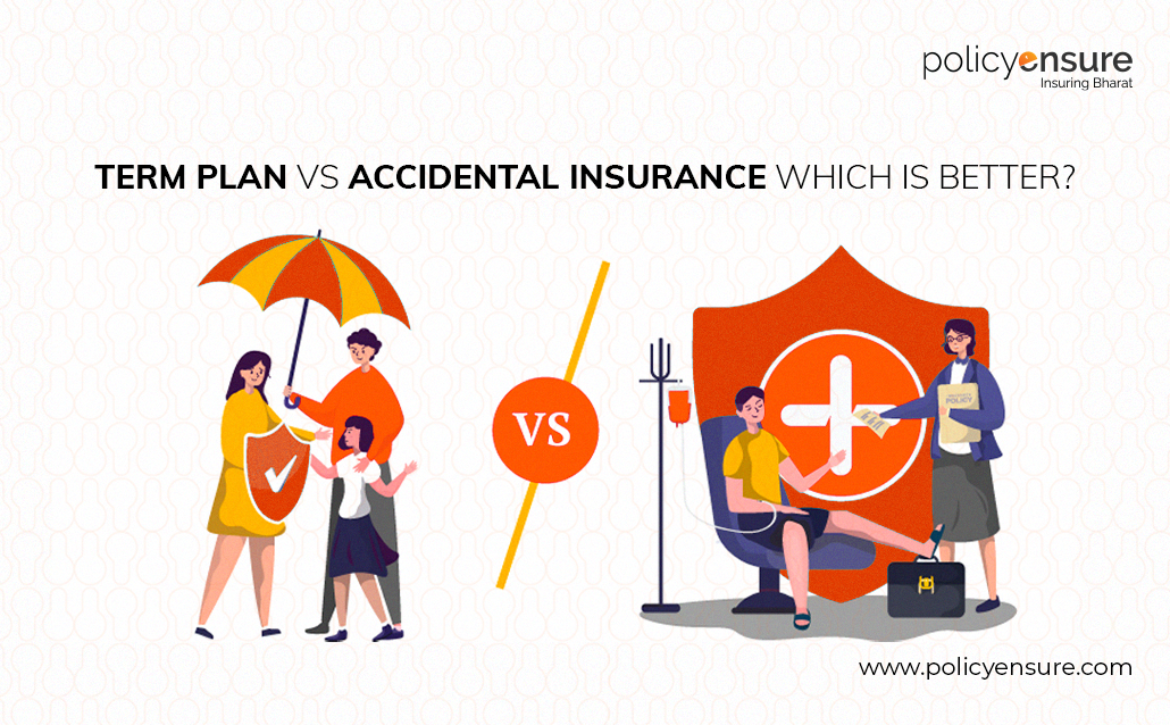Term Plan vs. Accidental Insurance: A Comprehensive Comparison
Term insurance and accidental insurance play a critical role in providing financial security and peace of mind to individuals and their families. It acts as a safety net in times of adversity, offering protection against unexpected events.
Term Insurance, also known as Term Life Insurance, is a type of life insurance that provides coverage for a certain period. It’s a simple and affordable life insurance that pays out a death benefit to the beneficiaries if the insured person passes away during the policy term. The policyholder receives the death benefit in a lump sum payment. Term insurance is customizable, and you can choose the policy term that works best for you. However, it doesn’t offer any investment component or cash value, and it doesn’t pay out any benefits if the policyholder survives the term. Some products provide facility like the return of premium in case the insured survives till maturity of policy.
Accidental Insurance, also called Personal Accident Insurance, is designed to provide financial coverage in the event of an accident that results in bodily injury, disability, or death. Unlike term insurance, which focuses on the risk of death, accidental insurance focuses on the risks associated with accidents namely permanent disability, partial disability and loss of pay due to
leave. Accidental insurance is more affordable than comprehensive health or life insurance policies, and many policies don’t require extensive medical underwriting. It provides coverage for specific outcomes resulting from accidents and offers benefits such as accidental death or disability.
Both term insurance and accidental are important types of insurance that provide financial protection to individuals and their loved ones in case of an unexpected event.
Comparing Term Insurance and Accidental Insurance
1. Coverage Focus:
Term Insurance: Focuses on providing a death benefit to the nominee or beneficiary in the event of the policyholder’s death due to any cause, whether it’s natural or accidental.
Accidental Insurance: Primarily covers accidents leading to bodily injury, disability, or death. It does not provide coverage for death due to natural causes or illnesses.
2. Premium Costs:
Term Insurance: Generally more affordable in terms of premium costs, making it an attractive option for individuals seeking high coverage at a lower cost.
Accidental Insurance: Typically offers lower premiums due to its specialized focus on accidental risks, but it may also provide lower coverage amounts than term insurance.
3. Benefit Payouts:
Term Insurance: Provides a lump-sum death benefit to the nominee or beneficiary upon the policyholder’s death, regardless of the cause.
Accidental Insurance: Offers benefit payouts related explicitly to accidents, such as death and disability benefits, and coverage for injuries like fractures and burns.
4. Policy Term:
Term Insurance: Typically offers a variety of policy term options, allowing you to choose the duration that best suits your needs, often ranging from 5 to 40 years or more.
Accidental Insurance: Usually comes with shorter policy terms, often renewing annually or for a few years at a time.
5. Maturity Benefit:
Term Insurance: This does not provide any maturity benefit except the return of premium if the policyholder survives the term. It is solely designed to provide a death benefit.
Accidental Insurance: Typically does not offer a maturity benefit as well, as it focuses on coverage related to accidents.
6. Medical Underwriting:
Term Insurance: Often involves a thorough medical underwriting process, which may require medical examinations and detailed health history disclosures.
Accidental Insurance: Many accidental insurance policies do not require extensive medical underwriting, making them more accessible to individuals with pre-existing health conditions.
7. Supplemental Coverage:
Term Insurance: This does not typically act as supplemental coverage for health or accidental risks. It is primarily focused on providing a death benefit.

Accidental Insurance: Often purchased as supplementary coverage alongside health or life insurance policies to address accidental risks specifically.
The choice between term and accidental insurance depends on your specific financial needs, risk profile, and preferences. Choose term insurance for comprehensive coverage against natural and accidental risks, long-term protection for your family, a cost-effective solution, and a primary policy for those without existing health or life insurance. Choose the best accidental insurance plan if you want supplementary coverage for short-term needs, minimal medical underwriting, and affordable protection specifically for accidental risks. Consult with a qualified insurance advisor to help you make an informed decision. Don’t forget to review and update your insurance coverage periodically to ensure it meets your changing needs.



